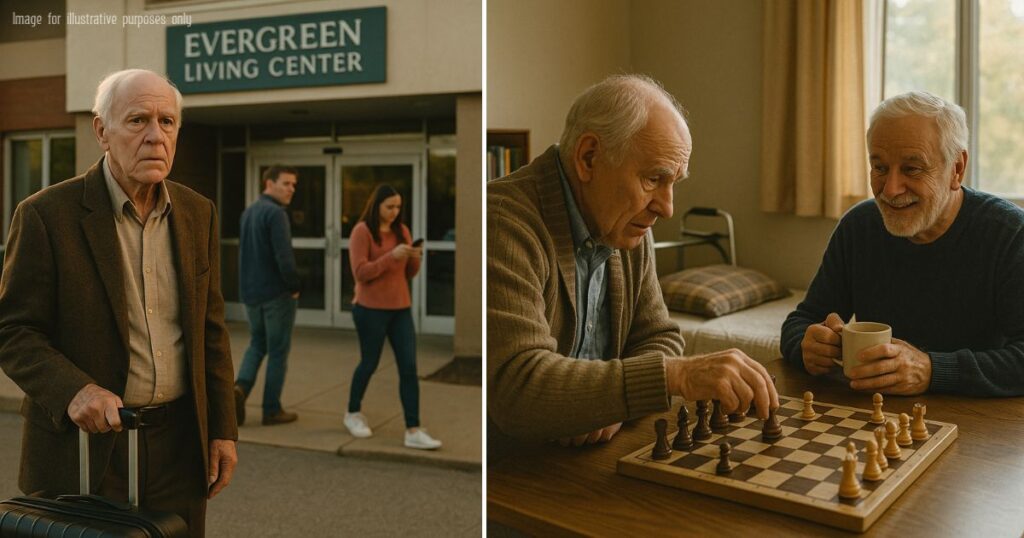They emptied my fridge, packed my clothes, and told the neighbors I was moving someplace “nice.” Then they drove me to a nursing home, hugged me at the door—and disappeared.
It was a Sunday. My daughter brought flowers, my son carried a duffel bag, and they both smiled too much. The front desk lady said, “Welcome, Mr. Carter. We’ll take good care of you.”
The automatic doors slid shut behind them. That was the last I saw of my children.
They didn’t leave a number. Or a forwarding address. They didn’t tell me they’d already sold my house. Or that my checking account had been drained two days before.
I sat in Room 214 that night and stared at the beige walls, the emergency button, and a laminated welcome folder that smelled like bleach. That was the night I learned what betrayal really tastes like: stale, fluorescent, and quiet.
But the silence was the worst part.
Not the abandonment. Not the missing money. Not even the fact that I had to borrow a comb from the nurse because mine had been “forgotten” in the move.
No.
It was the silence that did it.
No birthday call in July. No check-in on Father’s Day. No text, no email. Just a hole where my family used to be.
The only voices I heard came from the hallway: pill carts rolling, TVs humming, people who forgot where they were and others who remembered too much.
At first, I didn’t speak. I ate alone. I sat near the window and watched birds. Days passed like rain: slow, cold, and hard to notice until you’re soaked in it.
Then came the fire alarm.
It was a Wednesday afternoon. False alarm. Sprinklers didn’t go off, thank God. But the whole wing was evacuated to the lobby. That’s where I met Tony.
Tony was 79, used a walker, and swore like a trucker with a toothache. He looked me up and down and said, “New guy? You look like a damn banker.”
“I delivered mail for 42 years,” I said.
“Well,” he grinned, “then you know how to take crap from strangers. You’ll fit in here just fine.”
That night, he wheeled into my room with a chessboard.
“You play?” he asked.
“Not since my wife passed.”
“Well, she’s not here to beat us. Let’s go.”
And so, a ritual began.
The Hidden Talents of the Forgotten
Tony introduced me to the others. Grace in 218 used to sew costumes for Broadway. Leonard in 209 built guitars. Mrs. Brooks in 212 made stained glass. I thought I’d landed in a retirement home—but it was more like a forgotten university, full of experts no one listened to anymore.
I had my own skill: writing. Letters. Speeches. Newsletters. I used to write for the union, did community articles on the side. Words were always my tools.
One night over meatloaf, I said, “Why don’t we do something?”
“Like what?” Grace asked.
“Something real. Start a little project. Sell something. Show people we’re not done.”
Tony smirked. “What, you wanna build an empire from room 214?”
“Maybe just a spark,” I said.
They laughed. But two days later, Grace rolled in with a box of fabric scraps. Leonard showed up with two tiny guitars he’d built from cereal boxes. Mrs. Brooks handed me a sun-catcher she’d made from an old broken lamp.
Tony brought coffee.
“Every kingdom needs a fuel supply,” he said.
The Birth of ‘Still Got It Co.’
We picked a name: Still Got It Co.
I borrowed the nurse’s laptop. Created a free website with an online store. Grace stitched tote bags. Leonard made keychains. I wrote product descriptions like I was selling diamonds.
Each item came with a card:
“Made by someone the world forgot… but who still had more to give.”
We started small. I listed six items. Then I made a Facebook page. Posted a picture of Tony holding a mug that said “Grumpy But Employed.” That post got 37 shares.
The next day, we had four orders.
A week later, a local blog wrote about us: “Elders Launch Business from Nursing Home.”
Then came an interview. A podcast. A radio spot. People loved the idea—not out of pity, but admiration. We were working. We were making. We were visible.
By the end of that year, we had $8,200 in sales and a waiting list of volunteers wanting to join.
The staff helped us set up a small production room. The director even applied for a community grant—and got it. We bought a new printer, craft supplies, and even hired Maria, a nursing student, to manage our social media part-time.
Tony called her “our Chief Youth Officer.”
We started mentoring students. Teaching woodworking. Donating profits to veterans in the home. A company reached out and asked if we’d make branded notebooks for their holiday drive.
One day, we received a handwritten letter from a man in Montana:
“Your work reminded me my mother still matters. I drove seven hours to visit her after seeing your story. Thank you.”
We read that one aloud, twice.
When the Past Knocks Again
Two years in, we weren’t just surviving. We were creating. We had a full line of products, a logo, and a second team in another facility across the state.
Then my son showed up.


